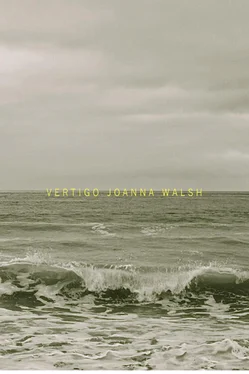One of these stories is for E.
One is for F, one is for R, one is for L, and one is for X.
A friend told me to buy a red dress in Paris because I am leaving my husband. The right teller can make any tale, the right dresser can make any dress. Listen to me carefully: I am not the right teller.
Even to be static in Saint Germain requires money. The white stone hotels charge so much a night just to stay still. So much is displayed in the windows: so little bought and sold. The women of the quarter are all over forty and smell of new shoe leather. I walk the streets with them. It is impossible to see what kind of woman could inhabit the dresses on display — but some do, some must.
We turn into Le Bon Marché, the women and I.
Le Bon Marché is divided into departments: fashion, food, home. It is possible to find yourself in the wrong department, but nothing bad can happen here. Le Bon Marché is always the same and always different, like those postcards where the Eiffel Tower is shown a hundred ways: in the sun, in fog, in sunsets, in snow. There are no postcards of the Eiffel Tower in the rain but it does rain in Paris, even in August, and when it does you can shelter in Le Bon Marché, running between the two ground-floor sections with one of its large orange bags suspended over your head (too short a dash to open an umbrella).
Fin de collection d’été. In Le Bon Marché it is already autumn. In 95 degree heat, we bury our faces in wool and corduroy. We long for frost, we who have waited so long for summer. In the passerelle , the walkway between the store’s two buildings, a tape-loop breeze, the sound of water, photographs of a beach.
Je peux vous aider? the salesgirl asks the fat woman with angel’s wings tattooed across her back. The woman mouths, non , and walks, with her thin companion, into the passarelle , suspended.
The first effect of abroad is strangeness. It makes me strange to myself. I experience a transfer, a transparency. I do not look like these women. I want to project these women’s looks onto mine and with them all the history that has made these women look like themselves and not like me.
There is something about my face in the mirrors that catch it. Even at a distance it will never be right again, not even to a casual glance. Beauty: it’s the upkeep that costs, that’s what Balzac said, not the initial investment.
From time to time I change my mind and sell my clothes. I sell the striped ones and buy spotted ones. Then I sell the spotted ones and buy plaid. To change clothes is to take a plunge, to holiday. The thin girl in her checked jacket looks more appropriate than I do, though her clothes are cheaper. This makes me angry. How did her look slip by me? I was always too young. And now I am too old.
I cannot forgive her. I forgive only the beauties of past eras: the pasty flappers, the pointed New Look-ers. They are no longer beautiful and cannot harm me now. Even your other women seemed tame until I saw the attention you paid them. I no longer know the value of anything. And if you do not see me, I am nothing. From the outside I look together. I forget that I am really no worse than anyone else. But how can I go on with nobody? And how, and when, and where can I be inflamed by your glance? I can’t be friends with your friends. I can’t go to dinner with you, don’t even want to.
But why does the fat woman always travel with the thin woman? Why the one less beautiful with one more beautiful? Why do there have to be two women, one always better than the other?
Je peux vous aider?
Non.
There are no red dresses in Le Bon Marché. It isn’t the dress: it’s the woman in the dress. (Chanel. Or Yves Saint Laurent.) Parisiennes wear gray, summer and winter: they provide their own color. Elegance is refusal. (Chanel. Or YSL. Or someone.) To leave empty-handed is a triumph.
In any case, come December the first wisps of lace and chiffon will appear and with them bottomless skies reflected blue in mirror swimming pools.
To other people, perhaps, I still look fresh: to people who have not yet seen this dress, these shoes, but to myself, to you, I can never represent the glamour of a first glance.
To appear for the first time is magnificent.
There are many people in the oyster restaurant and they all have different relations to each other, which warrant small adjustments: they ask each other courteously whether they wouldn’t prefer to sit in places in which they are not sitting, but in which the others would prefer them to sit. Sometimes entire parties get up and the suggested adjustments are made; sometimes they only half get up then sit down again. Some of the tables in the restaurant face the beach and have high stools along one side so that diners can see the sea. Others have high stools on both sides so that some diners face the sea and others, the restaurant, but both, each other’s faces. Because of the angle of the sun and of the straw shades over the tables, the people who face the sea are also more likely to be in the shade. Not everyone can face the sea, not everyone can be in the shade.
The waitress passes. The people who face the sea cannot see her and cannot signal to her with their eyes. Facing the sea they can signal to nothing, as nothing on the beach can receive their signals, not the seagulls or the mother and toddler who are too far away, nor the occasional stork that picks through the rubbish. Yes, the beach has rubbish, though not much, and though the restaurant, by its presence, makes the rubbish unmentionable. All the beaches along this coast have some rubbish: either more or less than this beach. Here in the restaurant the diners who face the sea may notice it or ignore it, but they must accept the rubbish as part of the environment, just as they must accept the seaweed that covers the stones near the sea with a green slippery layer and which, unlike the rubbish, smells.
The smell of the seaweed must be accepted as part of the natural environment although it masks the scent of the oysters served at the bar, the smell of which is similar but different enough.
Farther along the beach, where the mother and toddler are paddling, the seaweed forms stripes of green that are pleasing, though this may be the effect of distance. The mother and toddler could have picked a better beach. Although all the beaches along this shore have some rubbish, some have less seaweed, and fewer stones. This beach is not good for paddling, but perhaps it is good for oysters. Yes, the seaweed, the rubbish, the smell, the stones must all be part of the environment oysters prefer, which must be the reason the oyster restaurant is here, allowing the customers seated at the tables to look out at the beach and the sea and, looking, to understand that it must be the environment natural to oysters, and to approve.
Because he has chosen to sit at a table looking out at the sea, in order to see and approve the environment natural to oysters including the seaweed the rubbish the seagulls the stork the stones the mother and the toddler, he cannot signal to the waitress and it is because of this, or because she is insufficiently attentive, or because the oyster bar employs insufficient staff during the busy summer season, that the waitress does not arrive with his order.
He says,
“Maybe they will bring the entire order at once, though I would have thought they would bring the drinks first.”
He says,
“They do not have enough staff.”
They employ the number of staff they can afford to employ and serve at a pace at which the staff is capable of serving. The capacity is natural and proportionally correct. Il faut attendre.
Читать дальше











